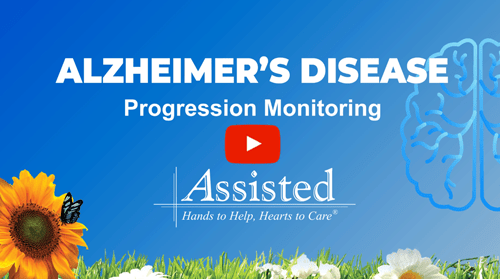Disease Type
 As we get older, it is expected that we will experience some degree of mental and physical decline. Occasionally forgetting where you left your keys or the date of your next doctor’s appointment is not cause for concern, as it is a part of normal aging. However, when you or a loved one experiences frequent memory loss that begins to affect activities of daily living, it can raise red flags. You may begin to question whether these lapses in memory are normal or are they early signs of Alzheimer’s Disease. Alzheimer’s is a progressive brain disease that affects memory, thinking, and behavior. It is the most common cause of dementia – a general term for memory loss and cognitive decline severe enough to interfere with daily life. Although there is no cure for Alzheimer’s, understanding its stages can provide insight into how to manage this disease.
As we get older, it is expected that we will experience some degree of mental and physical decline. Occasionally forgetting where you left your keys or the date of your next doctor’s appointment is not cause for concern, as it is a part of normal aging. However, when you or a loved one experiences frequent memory loss that begins to affect activities of daily living, it can raise red flags. You may begin to question whether these lapses in memory are normal or are they early signs of Alzheimer’s Disease. Alzheimer’s is a progressive brain disease that affects memory, thinking, and behavior. It is the most common cause of dementia – a general term for memory loss and cognitive decline severe enough to interfere with daily life. Although there is no cure for Alzheimer’s, understanding its stages can provide insight into how to manage this disease.
Early-stage Alzheimer’s (Mild)
Stage 1: No Cognitive Impairment
There are no issues with memory, judgment, or communication. In fact, your brain will change 10 to 15 years before you or a loved one notice the signs or symptoms of Alzheimer’s, making it difficult to catch early on. If Alzheimer’s runs in your family, talking to your physician can help you take the necessary steps (maintaining a balanced diet and regular exercise) to reduce the risk of it developing.
Stage 2: Very Mild Cognitive Decline
It can be difficult to distinguish Alzheimer’s symptoms from normal age-related memory loss. You may start to experience memory lapses, such as forgetting people’s names or losing things at home. You might notice subtle differences in the way you think, however symptoms can remain unnoticeable to others, including your physician. It is important to discuss your concerns with your physician to help slow down the progression of Alzheimer’s.
Stage 3: Mild Cognitive Decline
As the disease progresses, your loved ones and/or physician will notice signs of cognitive decline such as increased forgetfulness, decreased performance at work, speech difficulty, and difficulty focusing on everyday tasks. Symptoms in stage three usually manifest seven years after the onset of the disease and can include:
- Increased Memory Loss
- Trouble Concentrating
- Losing or misplacing objects
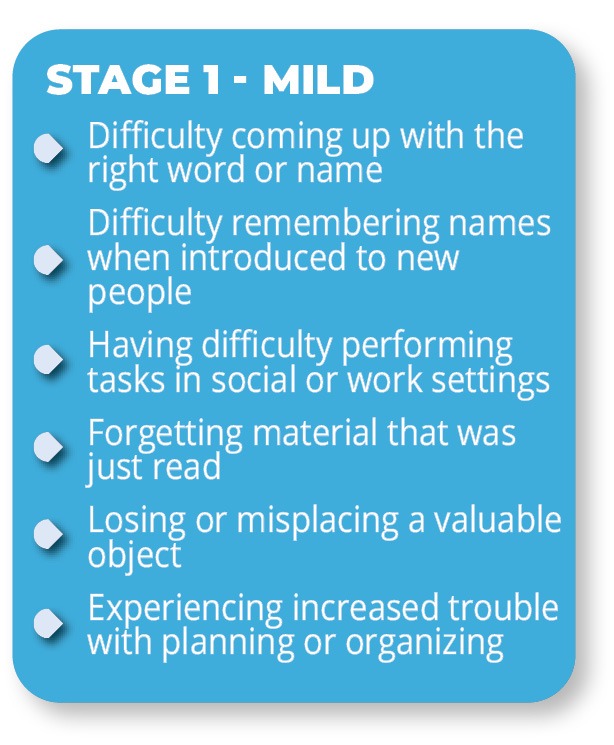
Middle-stage Alzheimer’s (Moderate)
Stage 4: Moderate Cognitive Decline
The cognitive decline your loved ones noticed in Stage 3 becomes more apparent. Recent events become harder to recall and you may find you have more difficulty concentrating. Complex activities of daily life, such as managing finances or preparing meals become harder to do. Other symptoms may include:
- Increased feelings of anxiety
- Irritability
- Depression
- Social withdrawal
- Misplacing items
Medication can help aid these symptoms, along with caregiver support. Assisted Home Health Aides are specially trained to help with grocery shopping, light housekeeping, and meal preparation, allowing you to spend more time with your loved ones.
Stage 5: Moderately Severe Cognitive Decline
During the fifth stage of Alzheimer’s, you may begin to need help with many day-to-day activities. You may start to lose track of where you are, what time it is and, have trouble recalling your address or phone number. People in stage five of the disease also experience:
- Difficulty dressing appropriately
- Significant confusion
- Hallucinations
- Paranoia
On average, Stage 5 lasts approximately 1 1/2 years and requires a lot of support. Patients who do not have enough support often experience feelings of suspicion and anger. Assisted Skilled Nurses can offer support in a multitude of ways such as: creating a care plan and establishing daily routines, administering medications when appropriate, encouraging safe exercise, and encouraging socializing with friends and family.
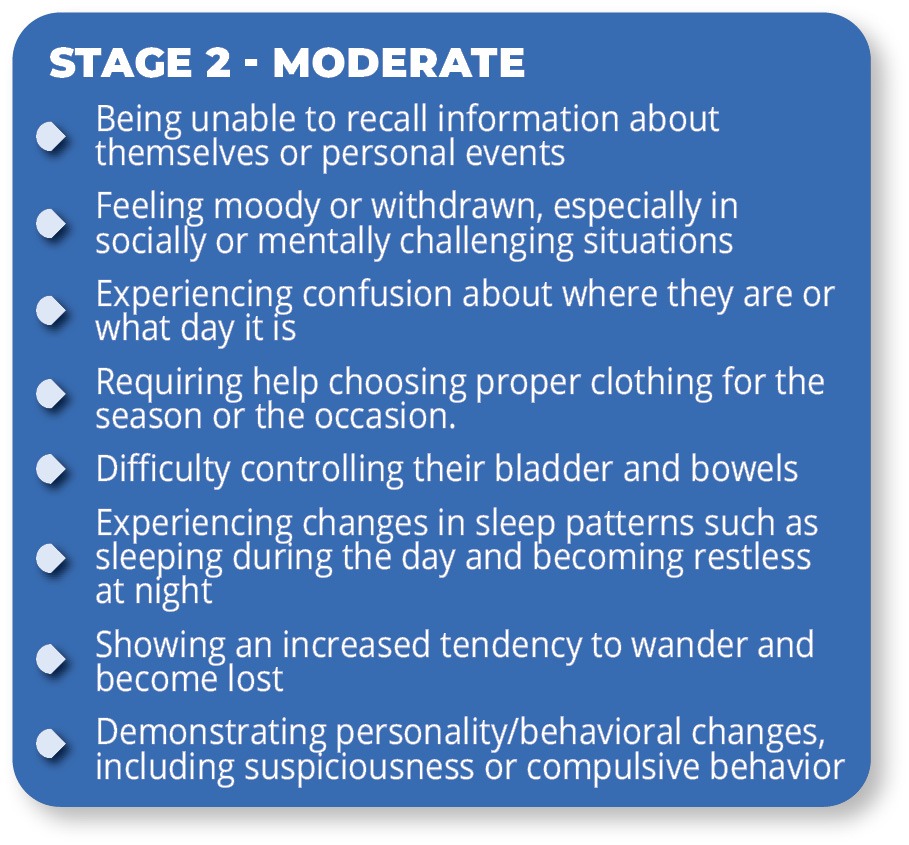
Late-stage Alzheimer’s (Severe)
Stage 6: Severe Cognitive Decline
Stage 6 marks a period in which you begin to require substantial assistance with activities of daily living. At this point, you may have little memory of recent events and forget the names of family members and close friends. Many people in this stage will also have difficulty completing tasks such as dressing, toileting, and eating. Significant personality changes become noticeable, as you may experience aggression, delusions, or anxiety.
Stage 7: Very Severe Cognitive Decline
In the final stage of Alzheimer’s, there is very severe cognitive decline. You will have lost the ability to communicate verbally and will require significant assistance with all activities of daily living, including bathing, eating, and walking. Caregivers should primarily focus on providing comfort, stability, and quality of life. Due to the terminal nature of the disease, your physician may suggest Hospice Care or Palliative Care to ease your symptoms. Assisted Hospice Care offers compassion and dignity while providing physical, emotional, and spiritual support. A highly skilled team of doctors, nurses, counselors, and volunteers work together to manage symptoms and reduce anxiety, ensuring your needs are met during this pivotal time in your life.
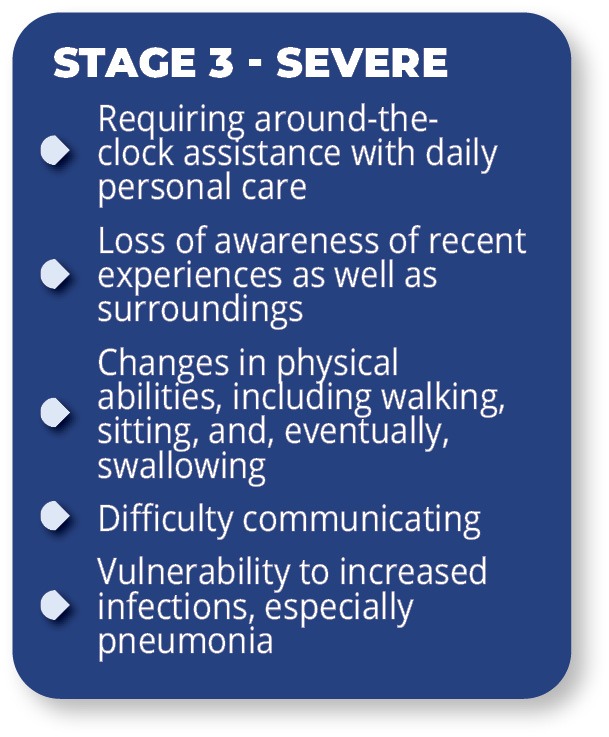
Alzheimer’s Disease Progression Video
Check out the following video to explore what to look out for as the disease progresses.
An Alzheimer’s diagnosis can be stressful for all involved. Each case is unique to the individual, and sometimes stages can overlap. However, understanding its stages can prove useful in symptom management and treatment. If you or a loved one have been diagnosed with Alzheimer’s Disease and would like to know how Assisted Home Health can support you, visit us at www.AssistedCares.com or call 800-949-6555 to learn more about how we can help you through every step of your journey.
Need Help? Call Our Professional Staff Now...800-949-6555
Awards and Certifications
Top Agency

Association of America

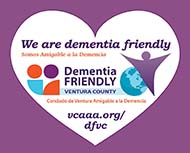
The owner of this website has made a commitment to accessibility and inclusion, please report any problems that you encounter using the contact form on this website. This site uses the WP ADA Compliance Check plugin to enhance accessibility.



